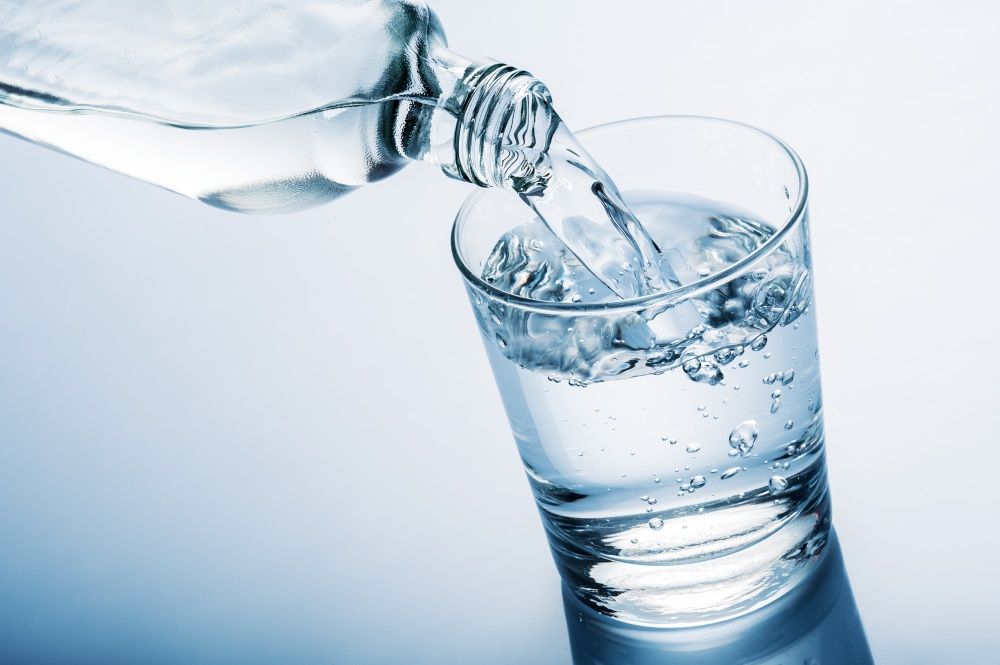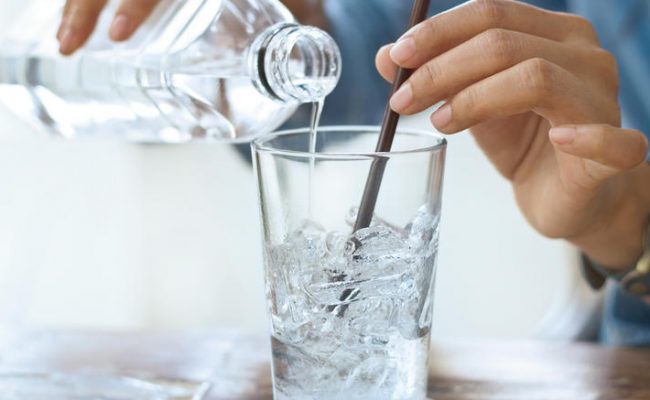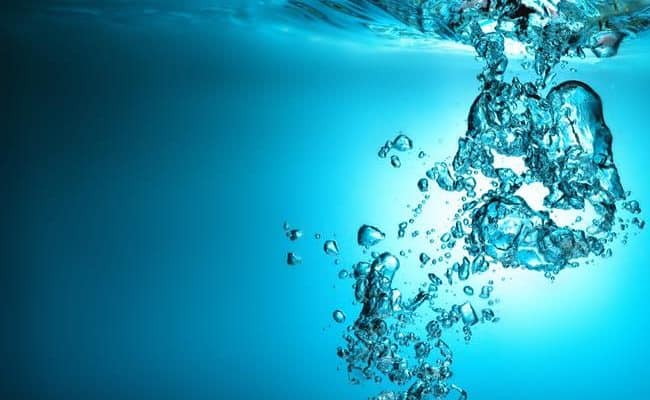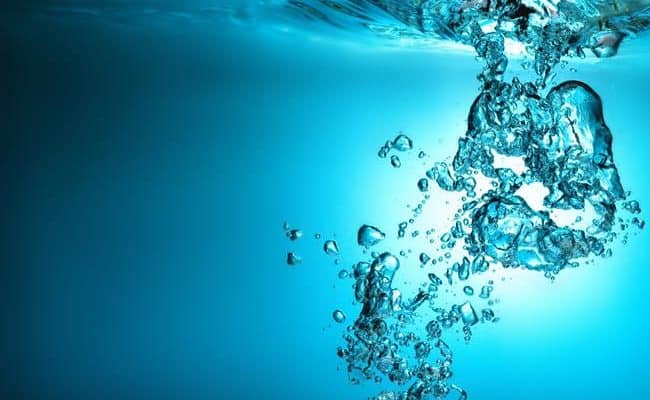
Drinking more water used to be a simple message. Just drink more water throughout the day period. However, now if you walk into a grocery store or surf the internet, you will see a multitude of different types of water you can buy.
Should you get electrolyte added water, alkaline water, purified water, etc?
Now instead of just aiming to get more water in your diet, many are wondering which water type is the best for you.
According to a July 2018 NPR article (1), plain old tap water in the US may be just as healthy as other fancier waters.
Some websites claim drinking alkaline water may offer several health benefits. Alkaline water is lower in acidity compared to regular water.
However, there is no research to support these claims. In fact, there may be some potential side effects from drinking alkaline water.
In this Guide:
What is alkaline water?
Alkaline water and blood pH
What are the health benefits of drinking alkaline water?
Does alkaline water hydrate more than plain water?
Alkaline water and cancer risk
Alkaline water and heart health
Will drinking alkaline water help you lose weight?
Alkaline water and heartburn relief
Are there risks with alkaline water?
Drug interactions with alkaline water
Is alkaline water better for you than plain water?
What is alkaline water?
The pH scale measures the acidity or alkalinity of things on a scale between 0 and 14. The lower the pH number, the more acidic it is. The higher the number the more basic (less acidic) something is.
For example, the pH in the stomach ranges between 1.5 and 3.5. The pH in the blood is tightly controlled between 7.35 and 7.45.
The pH in the blood can be considered neutral as it is right in the middle of the pH scale. The pH in the stomach is lower (more acidic) because of the hydrochloric acid in the stomach.
Pure water is considered to have a pH of 7 which is exactly neutral: neither acidic nor basic. However, drinking water can range from having a pH 6.5 to 8.5 making it slightly acidic or basic.
Alkaline water is considered to have a pH closer to 8 or 9.
Bottom line
Alkaline water is considered more basic (more alkaline) than regular tap water.
How is alkaline water made?
Water can be naturally more alkaline if it has dissolved minerals in it. Natural alkaline water can come from some springs or artesian wells (2).
Water can also be made more alkaline from an ionizing process from machines. Commercially sold alkaline water could be made this way or from a natural alkaline water source.
There are also water ionizing machines you can buy for home use.
Bottom line
Alkaline water may be naturally found from some springs, but it can also be artificially made with an ionizing machine.
Alkaline water and blood pH
Why would someone even think up drinking alkaline water? What would make it beneficial to drink water that has a pH closer to 8 or 9 instead of 6.5 to 7?
Advocates of alkaline water suggest drinking it can help neutralize the acidity in the blood and the body. Proponents suggest when the body is too acidic, this may increase risk for various diseases.
It is also suggested drinking alkaline water can help lower the pH of the blood.
But can drinking alkaline water really lower the blood pH?
Dr. Fenton, registered dietitian and epidemiologist at Cumming School of Medicine at the University of Calgary, suggests in an April 2018 New York Times article (3), the pH of the water you drink doesn’t impact blood pH.
When you drink water, it goes into the stomach which has a low pH because it is very acidic. Even if you drink water with a higher pH, it will get neutralized in the stomach.
Therefore, despite what proponents of alkaline water may suggest, the pH of your drinking water may have little to do with controlling the pH of the blood.
There is no research to suggest drinking alkaline water can lower the pH of the blood. If doing so could impact blood pH, blood pH would be susceptible to vast changes in pH levels which could be extremely dangerous.
What can impact blood pH levels? The kidney, lungs and liver all work to regulate tight control of blood pH.
If blood pH is even slightly too acidic or basic, serious health consequences can occur.
Bottom line
Despite claims on some websites, drinking alkaline water won’t help lower blood acidity levels. The body has other ways to tightly control blood pH levels.
What are the health benefits of drinking alkaline water?
There are many health claims associated with drinking alkaline water- some of which are general and vague.
For example, some websites suggest drinking alkaline water can:
- slow down the aging process
- regulate blood pH (which mentioned above has no supporting research)
- prevent various chronic diseases including cancer
- boost immune health
These claims sound good, but the evidence and research supporting these claims are lacking. More research is needed to verify these claims.
If you are drinking alkaline water to specifically address these health claims, speak with your healthcare team for other measures you can take to address these concerns.
According to Mayo Clinic (4), some studies have shown alkaline water may help prevent bone loss.
However, more research is needed to determine the safety and longevity.
Bottom line
There are many proposed benefits of drinking alkaline water, but most, if not all, are not backed up by sound research.
Does alkaline water hydrate more than plain water?
Some proponents of enhanced waters, like alkaline water, can claim to hydrate your body better than plain tap water. However, most health experts agree these claims are not research based.
What may be beneficial during longer endurance exercise is to drink something that has carbohydrates and electrolytes (sodium, potassium) along with water.
The electrolytes can replenish what is lost in sweat and can help re-hydrate the body. However, research studies are mixed on what may be the ideal ratio liquid for hydrating your body.
A 2016 study (5) assessed the effect of alkaline water on hydration after exercise induced dehydration.
About 100 research participants exercised in a warm environment until their body mass was reduced by 2% which is considered the amount for slight dehydration.
After exercise, participants were either given alkaline, electrolyte infused water or regular tap water in amounts needed to regain the lost 2% body weight. They were monitored for 2 hours after given fluids.
Researchers found there was no significant difference between the two types of water for rehydration in three of the four markers.
The alkaline water did have a significant effect on lowering viscosity of blood compared to the plain water group.
This study suggests alkaline water may be beneficial for rehydrating after dehydration related to exercise.
However, more research is needed. Only one biomarker of hydration status was different between the two groups in this study.
Chances are drinking regular water or a sports drink will adequately fill your hydration needs during or after exercise.
However, if you think alkaline water may be beneficial for long endurance training, consult a sports dietitian.
What about drinking water throughout the day for hydration needs?
Drinking alkaline water over tap water doesn’t have any superior benefit for hydrating the body. Regular water works just as well.
Bottom line
After exercise that causes mild dehydration, drinking alkaline water was shown to increase hydration more than regular water. However, drinking alkaline water over regular water in day to day life is not superior for hydration.
Alkaline water and cancer risk
Some websites claim drinking alkaline water can lower risk for cancer. Anytime a supplement or food product claims it can lower cancer risk, be wary.
These are usually not substantiated by valid research as is the case for alkaline water.
An overall diet rich in antioxidants may help lower cancer risk, but even then it is never guaranteed because so many factors influence cancer risk.
Proponents of alkaline water suggest cancer cells grow in an acidic environment. Therefore, the rationale is drinking alkaline water can help shift the body to being less acidic.
This rationale is not supported as drinking alkaline water does not shift blood pH.
It is true areas around cancer cells are more acidic than other parts of the body, and researchers are working on understanding why this is.
True cancer cells cannot survive in alkaline pH, but neither can healthy body cells.
Bottom line
Research to date does not support the idea that drinking alkaline water can help lower cancer risk or be used as a treatment for cancer.
Alkaline water and heart health
A preliminary study (5) in China did find alkaline ionized water significantly lowered blood pressure, blood lipids and blood glucose levels 3-6 months after consuming.
While these results do sound promising, more research is needed to substantiate any claims of alkaline water aiding in lowering blood lipids and blood pressure.
Drinking alkaline water is not a substitute for following other heart healthy diet and exercise habits.
Bottom line
Preliminary research has shown alkaline water may have benefit for lowering blood pressure and blood lipids, but more studies are needed to validate these claims.
Will drinking alkaline water help you lose weight?
There are testimonials on the internet claiming alkaline water can help with weight loss. However, these claims are not supported by research.
Drinking alkaline water alone without making any other changes will not lead to significant weight loss.
Bottom line
Drinking alkaline water will not significantly help with weight loss.
Alkaline water and heartburn relief
Stomach acid is needed to activate the digestive enzyme pepsin. Pepsin is an enzyme needed for breaking down proteins in the stomach.
In heart burn (acid reflux, reflux disease), stomach acid comes up from the stomach into the esophagus causing pain.
Chronic heart burn can cause injury to the esophagus region and can be activated by the enzyme pepsin.
A 2012 study (7) studied the effect alkaline water (pH 8.8) had on pepsin activation. Researchers found, unlike tap water, alkaline water may help with heart burn relief because it can inactivate the pepsin.
Therefore, those who suffer from heart burn may benefit from drinking alkaline water. However, before you ingest alkaline water for treating or preventing heart burn speak with your doctor first.
While this study is promising, more research is needed on alkaline water and any benefits with heart burn.
If alkaline water has a pH lower than 8.8- closer to 8- it is not known if the same benefits will be seen for heart burn.
Bottom line
A 2012 study found alkaline water (pH 8.8) may be helpful for inactivating pepsin in the stomach which may lower acid reflux.
Alkaline Water – Source of minerals
A health benefit of drinking alkaline water can be a source of minerals calcium, magnesium and potassium. Alkaline water from a natural spring water source will have the highest amount of minerals.
As the water passes over rocks, it picks up minerals along the way. Ionized commercially made alkaline water can also have minerals, but they are added to the water.
Note that although minerals from alkaline water can contribute to overall mineral intake, it won’t be a significant contribution to the diet.
Therefore, drinking alkaline water is no substitute for mineral rich food and drinks in the diet.
Bottom line
Alkaline water can contribute a source of minerals to the diet, but it is still relatively small amount.
Are there risks with alkaline water?
While most of the benefits associated with alkaline water have little scientific merit, the good news is drinking alkaline water in moderation may be considered safe for most people.
However, something to keep in mind is the cost of alkaline water is much more than regular water. If you are spending extra money on alkaline water, you may want to re-assess if it is worth the extra money.
Even though drinking alkaline water is generally considered safe, there may still be some safety considerations especially if taken in excess.
Too much alkaline can be dangerous
Consuming alkaline water that is extremely basic, like with a pH over 10, could cause some harmful side effects. More is not better when it comes to alkaline water.
Even though the stomach acidity can neutralize alkaline water, consuming it in excess can lead to lowering of stomach acidity and skin irritations.
Lowering stomach acidity can interfere with digestion and absorption of some nutrients.
Too much alkalinity could also cause tremors and mental confusion.
A 2015 case report (8) reports about a German town that had their water supply accidentally tainted to make it alkaline with a pH of 12.
As a result, people had complaints of skin irritations and digestive discomfort.
Bottom line
Consuming too much alkaline water or alkaline water that is too basic could cause unpleasant side effects.
Alkaline Water can cause digestive issues
Alkaline in excess in the digestive tract can cause issues. Even though alkaline water may be beneficial for heart burn, taking too much, especially if you don’t have heart burn, can cause digestive issues.
Reduced digestion in the stomach and possible reduced gallbladder emptying are some of the digestive side effects that may occur from too much alkaline intake.
Bottom line
Getting too much alkaline water may upset the digestive tract.
Cardiac damage in rats
An April 2018 New York Times article suggests research with rats and alkaline water indicates possible harm. Rat pups given alkaline water developed cardiac muscle damage and impaired growth.
More research is needed in humans to see if there are similar negative side effects and at what dose.
Bottom Line
Some research with rats suggests alkaline water damaged cardiac muscle and impaired growth.
Drug interactions with alkaline water
Some websites claim there may be interactions between certain medications and alkaline water. Therefore, consult your healthcare team before adding alkaline water to your diet if you are on any medication.
More research is needed on which medications alkaline water may interact with and what doses of alkaline water may be tolerable with certain medications.
Bottom line
Alkaline water may interfere with some medications.
Conclusion: Is alkaline water better for you than plain water?
So does alkaline water match the hype? Proponents of alkaline water suggest it has many health benefits. However, these benefits are not backed with scientific validity. Therefore, health experts warrant caution.
Drinking alkaline water in moderation is likely safe for most people.
However, if you are drinking it because you believe it may be giving some health advantages like lowering your risk for diseases, delaying aging or boosting immune health, you may want to reconsider purchasing the more expensive alkaline water.
Drinking alkaline water will not impact blood pH as it is sometimes marketed to do. Water reaches the stomach first where it is neutralized by the strong acid content.
The blood is finely regulated as any slight variance in blood pH can have drastic affects.
There is some evidence to suggest alkaline water may have an advantage for rehydrating athletes who are dehydrated.
However, when comparing the hydrating abilities for people throughout daily life or moderate exercise, the difference in hydration between regular water and alkaline water is minimal if any.
Alkaline may provide a trace amount of minerals especially if it is from a mineral source. An initial study did find alkaline water may offer a benefit for blood pressure and blood lipid levels.
More research is needed to confirm these initial findings.
As with any nutrition fundamental, when taken in excess, more is not always better with alkaline water. You can potentially get too much which could interfere with digestive and skin health.
When comparing different types of water, it’s important to remember drinking adequate water is key for overall health.
If you have access to clean water, that can be a simple solution for your hydration needs. You don’t have to over complicate your water choice.
Fancy waters may sound like they can offer many health advantages, but many of these claims are not backed up with sound science.










